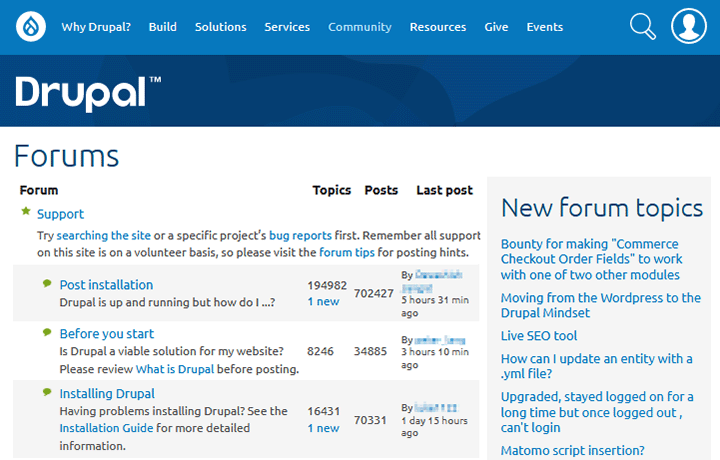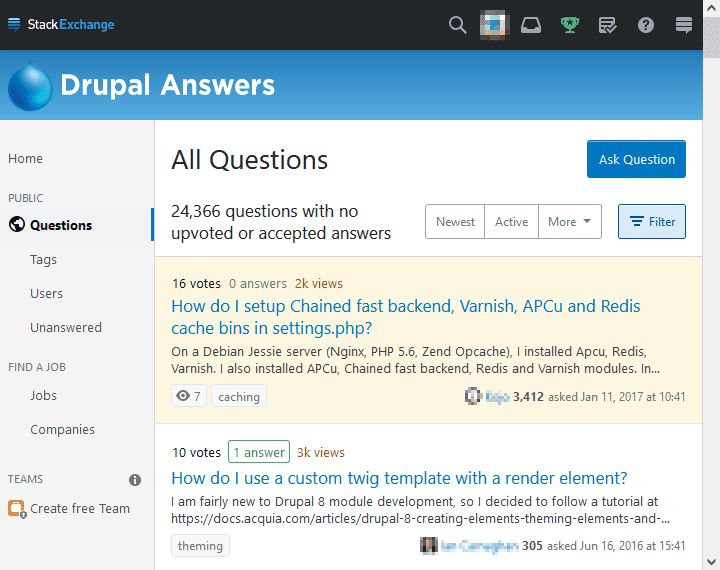Learn more about Drupal
This chapter tells you about websites you can visit and newsletter you can subscribe to, to learn more about Drupal. It also tells you want to do if you're need support for your own Drupal website.
Table of contents
Introduction
There exists many sources that provides support, documentation, tutorials and other information about Drupal, including some books. However, Drupal is a moving target and information on flat, dead trees tend to go stale. The most up to date information about Drupal is on the web. However, make sure you check the date for last update. There is also a lot of outdated information on the web.
Drupal.org
Drupal.org is the main portal to all things Drupal. It contains some very active forum where you can seek support from other members of the Drupal community, documentation avout the Drupal core contributed extensions and the Drupal API. This is also where yoy can sign up for email newsletters aout Drupal.
Forums
When looking for support, the first place to go is to the Drupal.org user forum section (see figure 23-1).
To access the forum, navigate to , or use this
URL: https://www.drupal.org/forum.

You don't need an account on the Drupal.org site to read the forum, but if you want to post your own questions, or to reply, you need one. Having an account also enables you to receive notifications when your questions get responses, as well as other news about Drupal.
In most cases, the Post installation forum is the first place to go to seek support for problems with your own website.
For support questions about the API the Module Development and Code Questions forum is probably the best place to seek support.
Issue queues
To find information about a core bug, search for it in the core issue queue. If it has not yet been resolved, you can follow the issue by pressing the word "Follow" in the issue's right margin. Any updates to the issue will then appear on your Drupoal.org dashboard. You may also use the core issue queue to report new core bugs.
 Please
be respectful of the Drupal core maintainers' time. The core issue
queue receives a lot of traffic and should not be used for
support requests. Use the forums instead.
Please
be respectful of the Drupal core maintainers' time. The core issue
queue receives a lot of traffic and should not be used for
support requests. Use the forums instead.
To get support for a specific project hosted on Drupal.org, find the module, theme, or distribution, search the project's issue queue, and either follow the relevant issue or create a new issue if you don't find one.
However, note that not all project maintainers provide support in their issue queues, and project maintainers are volunteers, so please be respectful of their time. Before posting an issue. make sure you read the Drupal.org guidelines about issue procedures and etiquette.
Newsletters
To stay current with security issues you may also want to sign up for Drupal's security announcements mailing list. You do this at Drupal's main site (drupal.org). First, create an account at drupal.org, and log in. Then navigate to . Check the checkbox next to “Security announcements” to subscribe.
Remember to click to save your subscription.
You may also subscribe to other announcements and newsletters. To do so navigate to and locate the section named "Communication preferences". Checkmark those communications you want to subscribe to. In the future, it is likely that the checkbox for “Security announcements” also will appear here.
Again, remember to click at the bottom of the page to save your subscriptions.
Additional resources
The following links are the some additional starting points when looking for information about Drupal on the Drupal.org website:
- Community Documentation – user contributed documentation.
- Drupal projects – user contributed projects (i.e. packages containing user contributed modules).
- Develop – the Drupal programming environment.
- Planet Drupal – aggregates broadly appealing, Drupal-related blog posts.
- Getting answers to your questions – what to do to get your support questions answered.
- Support channels – using the appropriate support channel may provide answers to support questions.
- Third party resources – links to resources not hosted by Drupal.org.
Additional resources for developers:
- API reference – the PHP API for all Drupal core modules.
- Hooks – callback functions for developers (the most useful part of the API).
The Drupal.org site can be searched, but in the past, search
results seem to be sorted fairly random, and you may have to look a
lot of obscure “issues” before you arrive at the main page about a
particular project or package. There is an
ongoing community
effort to fix search. However, it still looks like Google, if you
specify site:drupal.org as part of the search, return
more relevant results.
Drupal Answers
Drupal Answers on Stack Exchange is the Drupal-focused sub-site at the StackExchange Q&A site.

The site is targeted towards Drupal developers, site builders and administrators. It is a question & answer website. You may use ut to get support by asking a well-focused question about a single Drupal topic, including:
- How to solve a Drupal programming problem.
- How to solve a Drupal theming problem.
- How to solve a Drupal site-building problem.
- How to troubleshoot a Drupal website.
These questions are answered by other users, and are peer reviewed. The top answers are voted up, bad answers get downvotes, making it easier to locate the good answers. Tags make it easy to find questions that is relevant to a particuar topic.
 The
Drupal Answers website are also peer moderated, and bad and unfocused
questions receive downvotes and may even be closed (which means that
they no longer can be answered). Certain topics, such as hosting
advice and request for external resources are not allowed, and will
lead to downvotes and closure. I recommend spending some time to learn
how the website "works" before asking the first question. To get good
answers you need to be able to ask good questions.
The
Drupal Answers website are also peer moderated, and bad and unfocused
questions receive downvotes and may even be closed (which means that
they no longer can be answered). Certain topics, such as hosting
advice and request for external resources are not allowed, and will
lead to downvotes and closure. I recommend spending some time to learn
how the website "works" before asking the first question. To get good
answers you need to be able to ask good questions.
The site is heavily gamified, with a leaderboard showing the highest scoring community members, and those completing special tasks are rewarded with "badges" that show up on the user profile.
Books about Drupal
You may search online booksellers for books about Drupal. There is a lot to be found, but make sure that the book is about the version of Drupal you use.
The publisher Packt has a broad selection of ebooks about Drupal available.
In addition, I am aware of these ebooks about Drupal that can be accessed free of charge:
- drupalbook.org: Drupal Book
- selwynpolit.github.io: Drupal Book
Social media
X (Twitter) may seem an unlikely source for Drupal help and
information, but it's worth a bit of attention. You can screen for
tweets about Drupal topics by clicking on "# Explore" in the left
margin, and then typing #drupal in the search box that
appears on top of the creen (see figure 23-3).
Many of the resulting tweets point you at new themes, Drupal sites, and Drupal developments.

Facebook may seem like another unlikely resource, but the Facebook Drupal group is where companies and individuals blogging about Drupal post announcements about new posts.

To join the group, you need
a Facebook account. After you have
an account, click the small groups icon on the bottom right of the
screen. You can also browse directly to
https://www.facebook.com/groups/4684177179.
Other third party resources
The following links lead to third party websites that I've found helpful:
- TheDropTimes.com – Drupal news and reviews.
- Lullabot – Lullabot publishes podcasts and other materials about CMS software (including Drupal).
- VideoDrupal – curated mashup of Drupal videos published on YouTube.
- drupalize.me – collection of premium Drupal tutorials.
- Drupal8.ovh – Drupal 8 blog with some tutorials.
- drupal.slack.com – Slack-based support channel.
Last update: 2023-10-12.